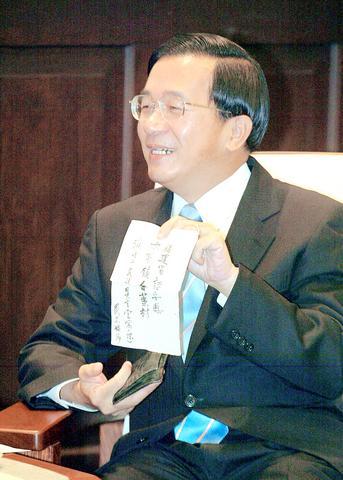President Chen Shui-bian (陳水扁) yesterday compared the Chinese Communist Party's rule to those of ancient Chinese imperial dynasties, saying that the "dictatorial empire" developed by Beijing would collapse sooner or later.
"The `one China' policy is actually a political myth to be used for consolidating the new `Chinese Empire,'" Chen said when he met Ross Terrill, author of The New Chinese Empire and head researcher at Harvard University's Fairbank Center for East Asian Research.
"I have noticed that the book pointed out the fact that the concept of `China' was born in late phase of the Manchu Dynasty, not 5,000 years ago," Chen said.

PHOTO: CNA
"And I agree with the perspective that the major difference between a modern nation and an empire is how they are created: an empire is built on military force while a modern state is born on the basis of all inhabitants' approval," Chen said.
"Therefore, the Chinese Communist regime, which is nothing but a reproduction of an ancient Chinese autocratic empire, will fall someday as its imperial predecessors in Chinese history did."
During the meeting, Chen endorsed Terrill's many points of view in his book, and he urged China to learn from Taiwan's democratic experiences.
In his book, Terrill says that the end of the Chinese party-state is at hand. He points to a number of conditions that might lead to the collapse of China, some of which played key roles in the fall of earlier dynasties, such as the Chinese polity's inability to handle succession and legitimacy issues; a revolt by farmers, especially in the peripheral provinces; and the emperor's misjudgment of the power of outsiders.
Chen also echoed Vice President Annette Lu (
"Though my ancestral home was in Shao-an County (
"Where my ancestors came from is one thing, but nationalistic identification is another, and they should not be confused," Chen said.
He said that the concept of China is significant in the fields of culture, civilization and even the way of life.
"But a political `China' will be built through democratic procedures, especially relying on the development of democracy," he said.
Terrill agreed that every election in Taiwan had facilitated the consensus of a new nationalistic identification.
Meanwhile, Chen reaffirmed that his promise of writing a new constitution was an undertaking in line with democratic processes and should not be described as a timetable for Taiwan independence.
"Beijing assumes that Taiwan's democratic reform, including the realization of a new constitution for meeting Taiwan's reality, is a move toward independence," Chen said.
"It is immoral and irresponsible," Chen added, "and the constitutional move will not be postponed because of Beijing's opposition."

MAKING WAVES: China’s maritime militia could become a nontraditional threat in war, clogging up shipping lanes to prevent US or Japanese intervention, a report said About 1,900 Chinese ships flying flags of convenience and fishing vessels that participated in China’s military exercises around Taiwan last month and in January have been listed for monitoring, Coast Guard Administration (CGA) Deputy Director-General Hsieh Ching-chin (謝慶欽) said yesterday. Following amendments to the Commercial Port Act (商港法) and the Law of Ships (船舶法) last month, the CGA can designate possible berthing areas or deny ports of call for vessels suspected of loitering around areas where undersea cables can be accessed, Oceans Affairs Council Minister Kuan Bi-ling (管碧玲) said. The list of suspected ships, originally 300, had risen to about 1,900 as

Right-wing political scientist Laura Fernandez on Sunday won Costa Rica’s presidential election by a landslide, after promising to crack down on rising violence linked to the cocaine trade. Fernandez’s nearest rival, economist Alvaro Ramos, conceded defeat as results showed the ruling party far exceeding the threshold of 40 percent needed to avoid a runoff. With 94 percent of polling stations counted, the political heir of outgoing Costa Rican President Rodrigo Chaves had captured 48.3 percent of the vote compared with Ramos’ 33.4 percent, the Supreme Electoral Tribunal said. As soon as the first results were announced, members of Fernandez’s Sovereign People’s Party

MORE RESPONSIBILITY: Draftees would be expected to fight alongside professional soldiers, likely requiring the transformation of some training brigades into combat units The armed forces are to start incorporating new conscripts into combined arms brigades this year to enhance combat readiness, the Executive Yuan’s latest policy report said. The new policy would affect Taiwanese men entering the military for their compulsory service, which was extended to one year under reforms by then-president Tsai Ing-wen (蔡英文) in 2022. The conscripts would be trained to operate machine guns, uncrewed aerial vehicles, anti-tank guided missile launchers and Stinger air defense systems, the report said, adding that the basic training would be lengthened to eight weeks. After basic training, conscripts would be sorted into infantry battalions that would take

GROWING AMBITIONS: The scale and tempo of the operations show that the Strait has become the core theater for China to expand its security interests, the report said Chinese military aircraft incursions around Taiwan have surged nearly 15-fold over the past five years, according to a report released yesterday by the Democratic Progressive Party’s (DPP) Department of China Affairs. Sorties in the Taiwan Strait were previously irregular, totaling 380 in 2020, but have since evolved into routine operations, the report showed. “This demonstrates that the Taiwan Strait has become both the starting point and testing ground for Beijing’s expansionist ambitions,” it said. Driven by military expansionism, China is systematically pursuing actions aimed at altering the regional “status quo,” the department said, adding that Taiwan represents the most critical link in China’s